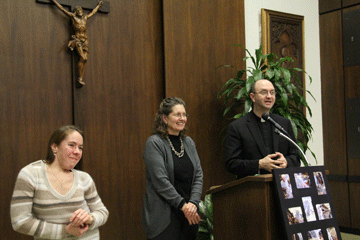The impact of poverty, earthquake and years of corruption and repression in Haiti – as well as the strong and widespread faith evinced by Haitians – was the topic of a presentation Friday, Dec. 9 at the Archdiocesan Pastoral Center. Father Bruce Lewandowski, Vicar for Cultural Ministries of the Archdiocese introduced speaker Johanna Berrigan, a Philadelphia-area physician’s assistant, whose volunteer work in Haiti has been ongoing for seven years.
When she first went to Haiti as part of a human rights delegation in 2004, she said she encountered “a country where there is a great deal of poverty and suffering.” But, she added, the people “are tremendously strong, faith-filled people.”
She worked initially with Father Gerard Jean-Juste in Port-au-Prince, who told her what was most needed in the island nation was help with health care. Since Berrigan had already started a clinic in Philadelphia that served the homeless and uninsured she asked the priest for what, exactly, was needed.
He hoped, Berrigan says the priest said, to maybe get some Tylenol and Tums for the people of his impoverished St. Claire parish. “That was the level of need,” Berrigan said, adding that even such humble, over-the-counter medicines were unavailable to the people to whom Father Jean-Juste ministered.
[hotblock]
Berrigan and other members of Philadelphia’s House of Grace Catholic Worker, along members of Pax Christi and other Catholic and Christian organizations, started training parishioners of St. Claire parish to become lay health care agents within their own community.
When the earthquake struck it took a while for the U.S. volunteers to find a way into Haiti via the Dominican Republic, but when they arrived to the St. Claire neighborhood, they found that the health agents they had only just started to train had already cleared a field and set up a makeshift clinic with rickety tables and tree logs marking designated sign-in, pharmacy and treatment areas.
Besides the actual health care that the lay health agents were providing for their beleaguered community, Berrigan saw another positive: “It was an opportunity for the Haitian health agents to see their worth reflected in their community’s eyes,” she said.
Kay Lasante (House of Health) was housed in tents for a while, but now they’ve started building a permanent clinic, and hired a doctor, a pharmacist and two nurses – in addition to the health care agents – to staff the clinic certain days.
“The needs are overwhelming,” Berrigan said. “Today there are still 1 million people living in tents (as a consequence of the earthquake).”
Maíre St. Ledger, who worked for Catholic Social Services in Philadelphia until the plight of those affected by Hurricane Katrina prompted her to become a nurse, has traveled to Port au Prince and seen the work at Kay Lasante. “The people of Haiti … know what community is,” St. Ledger said. “We hear about whether efforts (to help) are cost effective. But what is the true cost when a mother with AIDS or TB, etc., dies and leaves her children alone?”
Other speakers rounded out the afternoon event, which also featured photographs of the St. Claire Parish neighborhood in Port au Prince, and included traditional dishes prepared by a Haitian parishioner from Incarnation of Our Lord Parish in Philadelphia.
PREVIOUS: Archbishop Edwin O’Brien on Cardinal Foley’s death
NEXT: More than 1,000 turn out for celebration of feast of Our Lady of Guadalupe at Cathedral Basilica




Share this story